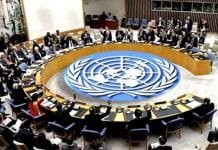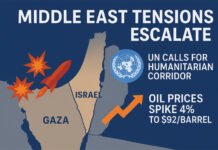INVC NEWS
Tel Aviv – The israeli Prime Minister Benjamin Netanyahu has declared a monumental offer that could potentially bring an end to the ongoing conflict with Hamas. Following the death of Hamas leader Yahya Sinwar, Netanyahu made a bold announcement that the war could be over by tomorrow, should Hamas agree to two key conditions: returning Israeli hostages and laying down their arms. This announcement has sent ripples across the globe, raising questions about whether Hamas will accept Netanyahu’s proposition and if the region is finally on the brink of peace.
The Demise of Yahya Sinwar: A Major Blow to Hamas
The Israeli military recently eliminated Yahya Sinwar, one of the last remaining top leaders of Hamas, alongside two of his close associates. Sinwar was a critical figure, not only for Hamas but also in the wider context of the conflict. He was one of the masterminds behind the October 7, 2023 terrorist attacks on Israel, which marked the largest assault on Israeli soil in recent history. Sinwar’s death, confirmed by Prime Minister Netanyahu in an official statement, symbolizes a crushing defeat for Hamas.
Netanyahu, in his address, highlighted the strategic significance of Sinwar’s death. According to the Israeli Prime Minister, this operation represents the beginning of the end for Hamas, whose leadership is now in disarray. With Yahya Sinwar eliminated, Netanyahu has extended a substantial offer to the people of Gaza, hinting at the possibility of peace if Hamas ceases its aggression.
A Peace Offer from Israel: Netanyahu’s Conditions for Ending the War
In a surprising move, Netanyahu extended a clear and direct offer to Hamas through a televised speech to the people of Gaza. He stated that the war could end by tomorrow if Hamas meets the following two non-negotiable conditions:
- Release of Israeli hostages: According to Netanyahu, Hamas is holding 101 hostages, including citizens from 23 different countries, and Israel is resolute in its mission to bring them back. The release of these captives remains one of the core demands of the Israeli government.
- Surrender of weapons: Netanyahu stressed that the conflict could cease if Hamas agrees to lay down its arms. This condition aims to permanently cripple Hamas’ ability to wage war against Israel.
Yahya Sinwar is dead.
He was killed in Rafah by the brave soldiers of the Israel Defense Forces.
While this is not the end of the war in Gaza, it's the beginning of the end. pic.twitter.com/C6wAaLH1YW
— Benjamin Netanyahu – בנימין נתניהו (@netanyahu) October 17, 2024
With these two key demands, Netanyahu has put the onus on Hamas to decide the future of the war. His message, though direct, was also one of hope for the people of Gaza, promising safety for those who cooperate with these terms. He assured the people that anyone who aids in the return of the hostages will be granted security under Israel’s protection.
The Ongoing Israeli Offensive: Taking Down Hamas and Hezbollah Leaders
Netanyahu’s declaration comes after a series of military victories for Israel, which has successfully neutralized several high-profile figures within Hamas and Hezbollah. The latest offensive, which led to Sinwar’s death, also saw the elimination of other significant militant leaders, signaling a strategic shift in Israel’s operations. In Netanyahu’s own words, the leadership structure of Hamas and Hezbollah is crumbling, and with each strike, Israel moves closer to dismantling Iran’s terror network in the region.
This offensive has also seen the deaths of other prominent figures such as Hassan Nasrallah and Mohsen Al-Ataibi, both key players in Hezbollah’s leadership. As Netanyahu pointed out, their demise represents a significant blow to the Iranian-supported terror infrastructure that has long plagued the Middle East.
Netanyahu also warned those still holding Israeli hostages, stating that Israel would relentlessly pursue anyone responsible for harming them. He reiterated that Israel’s eyes are firmly set on dismantling Iran-backed terrorism, both in Gaza and across the region.
The October 2023 Hamas Attack: A Turning Point in Israeli-Hamas Relations
To understand the gravity of Netanyahu’s recent declaration, it is essential to revisit the October 7, 2023 Hamas attack, which has drastically altered Israeli-Hamas dynamics. On that day, over 2,500 Hamas militants launched an unprecedented assault on Israel, causing widespread death and destruction. The attack, meticulously planned and coordinated, saw the deaths of over 1,200 Israeli civilians and the abduction of more than 250 people.
This attack marked the single deadliest day in Israeli history, and it shocked the world. It solidified Israel’s determination to eliminate Hamas once and for all. Netanyahu’s government vowed swift and decisive action, initiating what has now become a protracted military campaign against Hamas. The October 2023 attack serves as the primary catalyst for the current conflict, making the recent peace offer even more significant.
International Response to Netanyahu’s Offer: A New Chapter for the Middle East?
Netanyahu’s offer has not only garnered attention within Israel and Gaza but also sparked a wave of international reactions. Leaders across the globe are closely watching to see if Hamas will accept the terms and put an end to the bloodshed. Should Hamas agree to Netanyahu’s conditions, it could mark the beginning of a new chapter in the long and troubled history of the Israel-Palestine conflict.
Global powers such as the United States, Russia, and European Union have expressed cautious optimism. While most leaders welcome the prospect of peace, many remain skeptical about Hamas’ willingness to meet Israel’s demands. As Netanyahu continues to push for a peaceful resolution, the international community remains hopeful yet wary.
Hamas’ Dilemma: To Accept or Reject Netanyahu’s Offer?
Now, all eyes are on Hamas. The group’s decision will likely determine whether peace can be achieved in the coming days or if the conflict will continue to rage. Netanyahu’s demands are straightforward, yet highly challenging for Hamas. The release of Israeli hostages and the disarmament of its forces would not only weaken Hamas but also signal a significant loss of power in the region.
However, Hamas faces immense internal pressure from its remaining leadership and its supporters. The decision to either comply with or reject Netanyahu’s proposal will shape the group’s future, as well as the fate of Gaza’s population, which has already suffered extensively from the ongoing conflict.
















